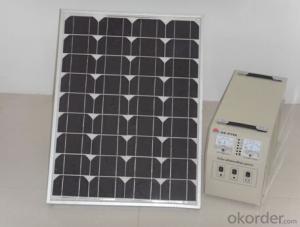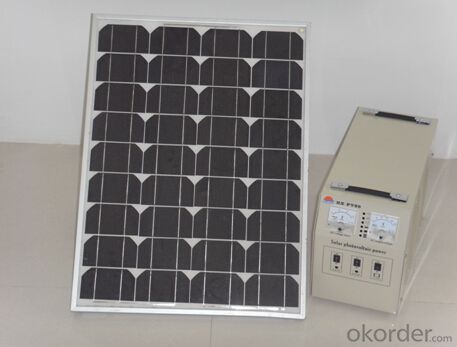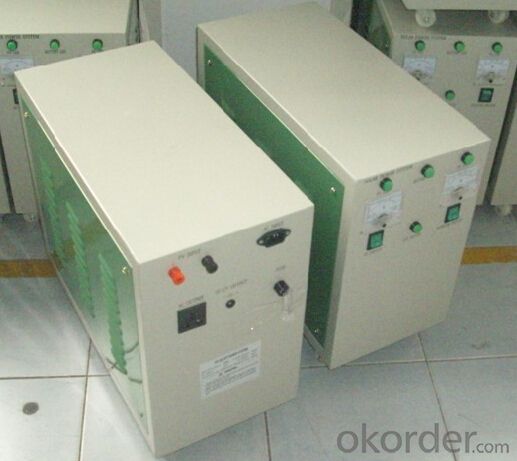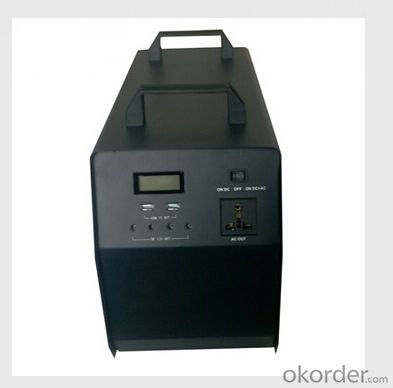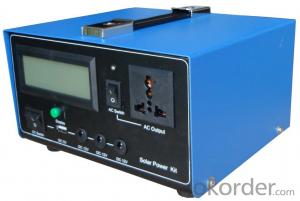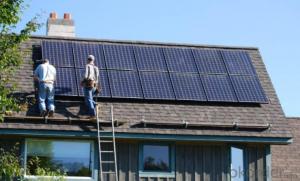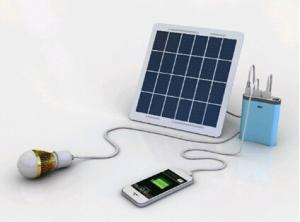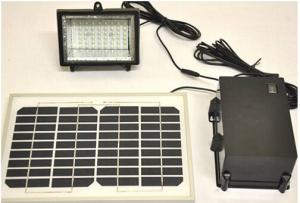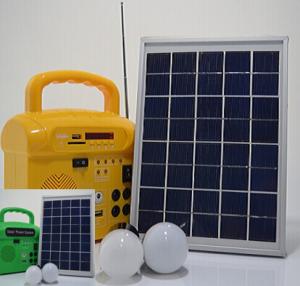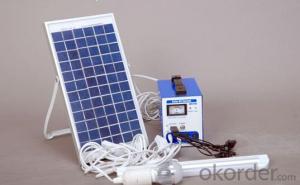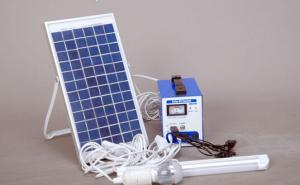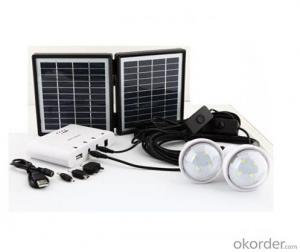Solar Energy Systems Adelaide - CNBM Solar Home System Roof System Capacity-80w
- Loading Port:
- Shanghai
- Payment Terms:
- TT or LC
- Min Order Qty:
- 10 PCS
- Supply Capability:
- 500000 PCS/month
OKorder Service Pledge
OKorder Financial Service
You Might Also Like
Introduction of Solar Home System
Solar Home System is composed by Solar Panels, Inverters, Charger Controller, Battery, Cable, Mounting Bracket, which is applied to produce electricity for home use.
Solar Home System is quite suitable product in urban area and the place which is short of electricity. As the cost of solar products reduced, more and more family can bear the charge of solar products. These products apply to schools, hospitals, public halls and private housing, communication stations, weather station. Also can use as household appliances, lighting, communications equipment, meteorological equipment.
Our company’s main target is to make every family can use cheap solar energy and enjoy the new innovation of modern science and technology.
Picture of Our Factory

Working Principle of Solar Home System
This is an off-grid solar system which uses batteries to store the solar energy, at the same time, the solar system can be connected with the grid for utilization of grid power. The solar system uses battery power in priority, but when sunshine is not so good or loads consumption is too big which caused the battery power inadequacy, then the system can switch automatically to grid power supply. Meanwhile, the system can charge the batteries with grid power until batteries are fully charged. Then the solar system will switch back to battery power supply.
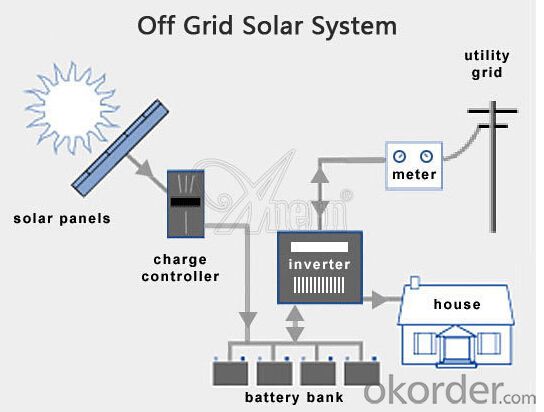
Product Details of Solar Home System
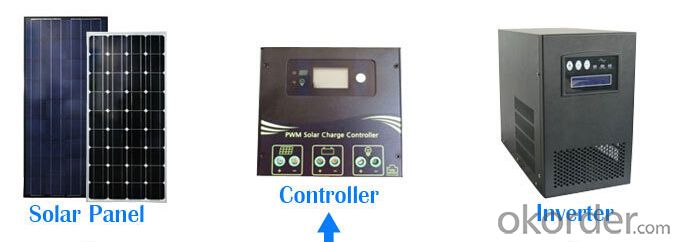
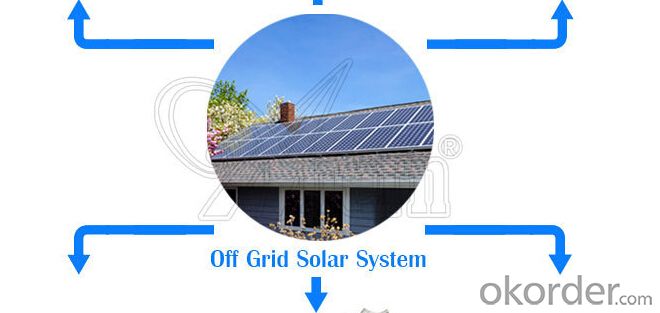

Specification of Solar Home System
Technical data: | |||||||||
Inverter | Rated load power | 500W | |||||||
Output wave | Pure sine wave | ||||||||
Input voltage | 24V | ||||||||
Output voltage | DC:12V | ||||||||
Output frequency | 50HZ/60HZ | ||||||||
Precision of output frequency | ±6% | ||||||||
Solar panel | Pmax | 100W*2PCS | |||||||
Vmp | 36V | ||||||||
Imp | 5.56A | ||||||||
Charger | Charger voltage & current | 24V10A | |||||||
Battery | Capacity | 12V80AH*2PCS | |||||||
Power box | Spray paint iron box,with input,output, ammeter,voltmeter,master switch and so on. | ||||||||
Package data: | |||||||||
Part | Size (L*W*H mm) | Weight (kg) | 20' (pcs) | 40' (pcs) | |||||
Power box | 580*520*540 | 60 | 96Sets | 240Sets | |||||
Solar panel | 1240*570*90 | 20 | |||||||
Solar panel bracket |
|
| |||||||
Loading electrical equipment(For consulting) | |||||||||
Name of Load | Power(W) | Quantity | Working Time per Day (H) | Working Days | |||||
Color TV | 65W | 1 | 4 | 3 days | |||||
Satellite TV Receivers | 25W | 1 | 4 | 3 days | |||||
lamp | 11W | 2 | 8 | 3 days | |||||
Other | 150W |
| 1 | 3 days | |||||
Advantage of Our Solar Home System
1 Excellent Performance: Our Solar Home System is composed by Brand Standard Kits with high quality. Our solar system has the advantage of high efficiency and stable operation. We can ensure our product with a long life period.
2. Small Orders Accepted: We can accept small orders as our customer’s trial order.
3. Guarantee/Warranty: We supply 10 Years Product Warranty and 25 Years Performance warranty.
4. Warehouse: We have warehouse overseas which can bring great convenience to our customer to pick up the products.
FAQ
Q: You are a manufacturer or Trader?
A: We are a Group corp. with 1GW capacity, which is Okorder’s registered VIP Supplier, enjoy Okorder’s Financial Guarantee.
Q: Required mainly certificates (CE&IEC/TUV/RoHS)?
A: Our products are certificated by CE RoHS, IEC, C-tick etc.
Q: Your main exported market is?
A: Main markets of our products is: South-east Asia, Mid-east, Arica, East Europe and Latin America.
- Q: Can solar energy systems be used for powering electric vehicle solar charging stations at rest areas?
- Solar energy systems can indeed be utilized for the purpose of powering electric vehicle solar charging stations at rest areas. By installing solar panels at these locations, sunlight can be captured and converted into electricity. This generated electricity can then be employed to fuel the charging stations, offering a means for electric vehicles to charge their batteries using clean and renewable energy. This incorporation of solar charging stations presents a noteworthy opportunity to efficiently and sustainably employ solar energy, thus diminishing dependence on fossil fuels and reducing carbon emissions. Furthermore, the integration of energy storage systems, such as batteries, with these charging stations allows for the storage of surplus electricity produced during the day. This stored energy can then be utilized during the night or on cloudy days, ensuring constant availability of charging services even when sunlight is not readily available. Ultimately, the utilization of solar energy systems to power electric vehicle charging stations at rest areas proves to be a solution that is both environmentally friendly and economically feasible.
- Q: Are there any disadvantages or limitations to using solar energy systems?
- Yes, there are a few disadvantages and limitations to using solar energy systems. Firstly, solar panels require a significant initial investment, making the upfront costs relatively high. Additionally, the efficiency of solar panels is dependent on factors such as weather conditions and geographic location, which may impact their energy production. Solar energy is also intermittent, meaning it cannot be generated during nighttime or cloudy days, requiring the use of energy storage systems or alternative power sources. Finally, the manufacturing and disposal of solar panels can have environmental impacts, although these are generally outweighed by the long-term benefits of using solar energy.
- Q: Are there any noise concerns with solar energy systems?
- Yes, there are minimal noise concerns with solar energy systems. Unlike traditional energy sources such as generators or wind turbines, solar panels do not produce any noise while generating electricity. The silent operation of solar panels makes them a preferred choice for residential and commercial installations.
- Q: Can solar energy systems be used for powering oil and gas extraction operations?
- Yes, solar energy systems can be used for powering oil and gas extraction operations. In fact, the use of solar energy in the oil and gas industry has been gaining traction in recent years. Solar power can be utilized to provide electricity for various operations such as pumping, drilling, and processing. It is particularly beneficial in remote areas where access to the grid may be limited or expensive. Solar energy systems can reduce the carbon footprint of oil and gas extraction operations by minimizing the reliance on fossil fuels for power generation. Additionally, solar power can lower operational costs in the long run, as it offers a more sustainable and cost-effective alternative to traditional energy sources.
- Q: How does the efficiency of solar panels vary across different installation tilts?
- The efficiency of solar panels can vary across different installation tilts due to several factors. The ideal tilt angle for solar panel installation depends on the geographical location and the intended purpose of the solar system. In general, solar panels produce the highest energy output when they are installed at an angle that maximizes the amount of sunlight they receive throughout the day. The optimal tilt angle for solar panels is typically equal to the latitude of the location, ensuring that the panels are perpendicular to the sun's rays during peak sunlight hours. However, the efficiency of solar panels can be affected by deviations from the optimal tilt angle. If the panels are installed at a steeper tilt angle, they may receive more direct sunlight during certain parts of the day, resulting in increased energy production. Conversely, if the panels are installed at a shallower tilt angle, they may receive more diffuse sunlight, which can reduce their efficiency. Furthermore, the efficiency of solar panels can also be influenced by the time of year. In many locations, the sun's position in the sky changes throughout the year, resulting in varying optimal tilt angles. Some solar systems are designed with adjustable mounting systems that allow for seasonal changes in tilt angle to maximize energy production. It is important to note that while the efficiency of solar panels can vary across different installation tilts, the overall energy output of a solar system is also influenced by other factors such as the quality of the panels, the cleanliness of the panels, and the presence of shading. Proper maintenance and regular monitoring of the system can help ensure optimal performance regardless of the installation tilt.
- Q: How does shading affect the performance of solar panels?
- Shading negatively affects the performance of solar panels as it obstructs the amount of sunlight reaching the panels, reducing their efficiency in converting sunlight into electricity. Even a small amount of shading can significantly reduce the overall power output of a solar panel or even render it completely inactive. Therefore, it is crucial to ensure that solar panels are installed in areas with minimal shading to maximize their performance.
- Q: Can solar energy systems be used for powering off-grid educational institutions?
- Yes, solar energy systems can be used for powering off-grid educational institutions. Solar panels can be installed on the roofs or grounds of the institutions to harness sunlight and convert it into electricity. This renewable energy source can provide a reliable and sustainable power supply, especially in remote areas where grid connectivity is limited or unavailable. Solar energy systems can effectively meet the energy demands of educational institutions, powering classrooms, lighting, computers, and other equipment. Additionally, it promotes environmental sustainability and reduces reliance on fossil fuels, making it a suitable option for off-grid educational institutions.
- Q: How do solar energy systems impact wildlife habitats?
- Solar energy systems have a minimal impact on wildlife habitats compared to other energy sources. While the installation process may temporarily disrupt habitats, once operational, solar panels do not emit pollutants or generate noise, reducing disturbance to wildlife. Careful planning and proper site selection can further mitigate any potential negative effects, allowing solar energy systems to coexist harmoniously with wildlife habitats.
- Q: How do solar energy systems contribute to reducing reliance on fossil fuels?
- Solar energy systems contribute to reducing reliance on fossil fuels by harnessing the sun's abundant and renewable energy to generate electricity. Unlike fossil fuels, solar energy produces no harmful emissions or pollutants, making it a clean and sustainable alternative. By using solar panels to convert sunlight into electricity, we can decrease our dependence on fossil fuel power plants and reduce greenhouse gas emissions, mitigating climate change and promoting a healthier and more sustainable future.
- Q: How long does it take for a solar energy system to pay for itself?
- The payback period for a solar energy system varies based on several factors such as the initial cost, location, energy usage, and available incentives. On average, it takes around 5-10 years for a residential solar energy system to pay for itself through energy savings. However, this timeframe can be shorter in areas with high electricity costs and substantial government or utility incentives.
Send your message to us
Solar Energy Systems Adelaide - CNBM Solar Home System Roof System Capacity-80w
- Loading Port:
- Shanghai
- Payment Terms:
- TT or LC
- Min Order Qty:
- 10 PCS
- Supply Capability:
- 500000 PCS/month
OKorder Service Pledge
OKorder Financial Service
Similar products
Hot products
Hot Searches
Related keywords
